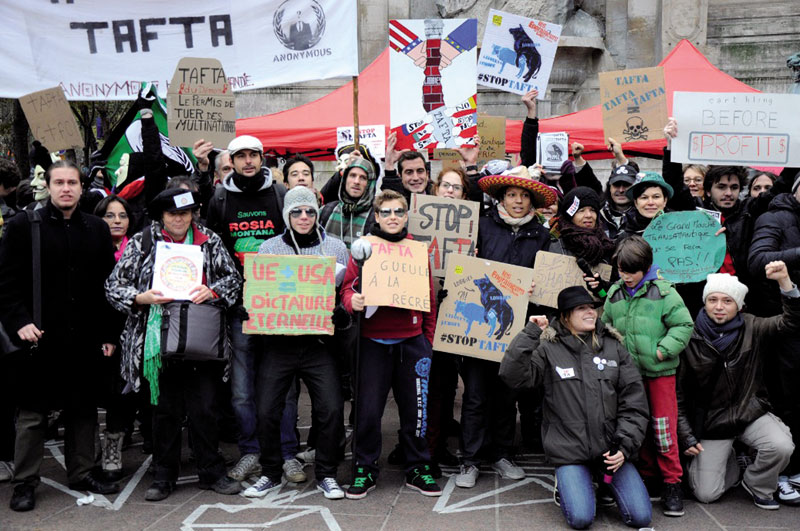
- Although officially Transatlantic Trade and Investment Partnership (TTIP), the fruit it will bring is better known: Transatlantic Free Trade Area (TAFTA), Atlantic Free Market Area. While citizens have their heads on the moon, they are squandering a change that will change the lives of all and all.

See how Wikipedia summarizes in English: “It was first mentioned in the 1990s and again in 2007. In 2013, the US-EU Higher Working Committee on Employment and Growth recommended addressing the negotiations of the Transatlantic Trade and Investment Partners Association.
It may be the largest free-market area that has been organised throughout history, including 46% of the world’s gross domestic product (...). If the Treaty is implemented in its entirety, the European Commission estimates that by 2015 it will create 400,000 new jobs, an aggregate wealth of EUR 545 per annum, Europe’s benefits of USD 160,000 and USD 128,000 million for the US. However, there are those who discuss these arguments and criticize the secret negotiations on the pact and the copyright clauses.”
It is not a miracle that no one mentions TAFTA in the accommodations where the last prowess of Athletic or Osasuna are screamed for coffee in the morning. But it is also clear that the citizenship that cares about the change of status or the right to decide of the CAV, including the author of this chronicle, knows nothing about TAFTA. But not by chance.
The United States is negotiating with great effort two trade treaties, one with the European Union and one with 11 countries of the Sea Barea, and progressives are being organised for the struggle. But are they so harmful?
The European Commission draws up an attractive business "Partenariat transatlantique de commerce et d'investissement (TTIP): Le plus important accord commercial au monde: It aims to remove existing barriers to increasing sales between the United States and the European Union, to reduce customs duties, to harmonise the various existing regulations in one way or another, which entails a reduction in costs for companies. It is also envisaged that this great liberalisation of markets will extend to the services sector, as well as to investments and public services, with the construction of new rules that will ultimately be valid for everyone.
How bad is it? In The Ecologist magazine, Ben Whitford (“Secret trade deals attack global health and environment”) replies: “These agreements will allow large companies to circumvent any limits set by the laws of each country.” But to what extent? “It is not known: negotiations have been secret and as lobbies defending the interests of large corporations are at the heart of the negotiations, those who could be against the treatment have been denied the information”.
The dictatorship of corporations
We present what The Ecologists announces to us with the new TAFTA. The exploitation of fracking gas is spread throughout all corners of the European geography, driven by the European moratorium and the export of U.S. gas. European markets will be filled with GM products, calves and pigs grown with hormones, chlorinated chickens. A new wave of cheap crop products is coming to Europe from the United States. European consumer protection rules will be relaxed for the benefit of corporations. The European authorities will lose control over chemicals. Renewable energy plans in Europe will be further weakened.
“Again in disasters!” the reader could complain. No, unfortunately. In the newspaper The Guardian, George Monbiot (“The lies behind this transatlantic trade deal”) has shown the risk that these negotiations are running hidden. “[Negotiation] The Commission insists that the TTIP bring within the poisonous ‘investor-state dispute settlement’ mechanism. This tool, in all the previous treaties that they have introduced, has given the multinationals the power to sue governments before secret groups of mediators, that is, before the bar commissions of corporations that make use of the decisions of the courts and of the local parliaments.”
Of course it is possible. The Swedish company Vattenfall has asked for compensation of EUR 3.5 billion. When Québec has imposed a moratorium on the exploitation of fracking gas, a U.S. company requires payments of $250 million. When the Australian government decided, after lengthy parliamentary deliberation, to sell cigarettes in undamaged packages and only with references to health risks, the company Philip Morris sued Australia using a trade agreement with Hong Kong as an excuse.
These cases draw our attention to the citizens of the rich West, who have been involved in states comparable to our societies. But first of all, everyone had suffered the harms of this strategy. When the Argentine Government decided, after its grave crisis, to freeze energy and water prices, the multinationals that took over these services received substantial compensation. More recently, when the people of El Salvador managed to persuade the authorities to stop the project of opening a giant gold mine, the Canadian company, which is behind that intention, has called on the Government to pay US$315 million on account of future profits.
But the key to these gigantic businesses is to bring them to trial. “Corporations,” said Monbiot-, make their claims before the committee established by the treaties [as TAFTA] for discussions between investors and states. In the committees or in the panels there is no guarantee we have in our courts. Litigation is done in secret as a summary. Judges are business lawyers, many of whom charge the wages of corporations found in similar cases. The inhabitants of the area have no words in their decisions. There is no right of appeal. And they are above the local courts and all parliaments.”
It has only just begun to emerge in Europe from one of the great debates of the twenty-first century: if, after the appropriation of land, water, capital, wind and all goods in general, corporations are also able to privatise the judicial and political authority, taking away from the citizens the last rays of sovereignty. Full mouthpiece for rich with TAFTA?